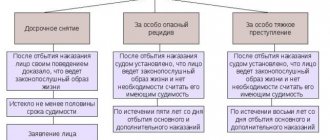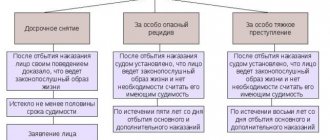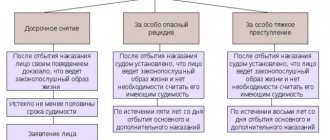It is possible to remove an expunged criminal record from the database only in theory. The only legal way is to obtain an appropriate court decision. Everything else is illegal and, moreover, criminally punishable. In this case, it is absolutely unimportant what information needs to be deleted - a suspended or expunged suspended conviction, a real sentence, information about the initiation of criminal prosecution or detention as a suspect, termination of prosecution, or other information included in the GIAC database of the Ministry of Internal Affairs of the Russian Federation.
○ The procedure for entering a criminal record into the database.
The procedure for entering data on crimes is provided for by the Model Regulations, approved by the joint order of law enforcement agencies dated December 29, 2005 “On a unified record of crimes.” According to clause 4.1 of the Regulations, the inquiry officer, prosecutor, and investigator have the right to record information about criminal offenses.
In accordance with paragraphs. 17-19 of the Regulations, data enters the GIAC of the Russian Federation in the following way:
- A criminal case is being opened.
- Within 24 hours (except for holidays and weekends) from the moment the supervising prosecutor makes a decision on the case, the body conducting the investigation transmits information to special registration and accounting departments.
- Registration and accounting departments throughout the day transfer accounting documentation to the Information Center responsible for processing information (for each category of cases and in each subject of the Russian Federation there is its own Information Center, for example, Information Center for Transport, Information Center of the Military Prosecutor's Office).
- ICs generate statistics on crimes. The information is transmitted to the SIAC of the Russian Federation.
“Every crime is subject to accounting (based on its legal qualification according to a specific norm of the Criminal Code of the Russian Federation), upon the commission of which, regardless of the time of its commission: a criminal case has been initiated; a decision was made to refuse to initiate a criminal case on non-rehabilitative grounds; a guilty verdict was passed in a private prosecution case” (clause 27 of the Regulations).
The GIAC of the Russian Federation contains:
- Personal information about the criminal.
- Information about the criminal record: number of proceedings, grounds for prosecution, date of the verdict, punishment incurred, information about changes in the court decision, whether the criminal record was withdrawn or expunged.
- Information about being wanted.
- Arrest information.
- Fingerprint formula.
If a person’s guilt is proven, information about him will definitely go to the GIAC of the Russian Federation, even if it was just a “conditional conviction.”
“All persons in respect of whom a decision was made to refuse to initiate a criminal case on non-rehabilitative grounds, to terminate a criminal case or criminal prosecution on non-rehabilitative grounds, a criminal case was sent by the prosecutor to the court with an indictment (act) or a criminal conviction was issued are subject to registration. case of private prosecution" (clause 40 of the Regulations).
Removal of information from the GIAC of the Russian Federation is provided only for rehabilitative reasons (clause 38 of the Regulations).
Is it possible to remove a criminal record from the database?
Having a criminal record in the Ministry of Internal Affairs database really interferes with life, because it imposes certain restrictions.
First of all, a person may not be hired for a prestigious job if it turns out that he was prosecuted. Moreover, employers can easily find a “black mark”, after which a person will be denied employment, or he will have to leave his job. There will also be problems with leaving Russia even for a holiday abroad: to Ukraine, Kazakhstan, Belarus, Uzbekistan and other countries. Because other states are reluctant to accept people with a criminal record. Moreover, it will be extremely difficult to move from the Russian Federation if the database contains information about the citizen’s dishonesty.
Considering the fact that the “black mark” has a bad effect not only on the former criminal, but also on his relatives, many want to remove it. To do this, it will not be enough to expunge the criminal record or wait a certain time. Even deleting it after years of prescription will be problematic, because information about the institution of a criminal case will be stored for 25 years. Moreover, the database in the Russian Federation is common to everyone, and moving to another city will not help.
You can try to remove a mention only in certain situations:
- An error was made by authorized employees. That is, the information was entered incorrectly. In this case, the entry will be quickly deleted.
- The court acquitted the citizen. This is a good reason to get rid of the criminal liability label.
Important! Note that even if a person is convicted on probation, an entry is still made in the database. Moreover, it will last for more than one year.
Let us emphasize once again that the statute of limitations for storing criminal cases is 25 years. But with a mark in the database, things are even more serious. The information is stored there for life, because there is a risk of relapse. Accordingly, it is important to know whether a particular person has been previously convicted.
People can only try to cancel the information through a judicial authority. But clearing your reputation is not possible in all cases. If someone offers to remove a mark for money, then they are scammers.
○ Who has access to information?
Only law enforcement agencies have access to the GIAC of the Russian Federation. The information in the database is necessary for their internal use and is not subject to public dissemination.
According to clause 2 of Administrative Regulation No. 1121, which regulates the procedure for obtaining information from the GIAC of the Russian Federation, the circle of recipients of information on citizens’ criminal records includes only individuals and their representatives.
There is an opinion that a large circle of people, including employers and banks, can obtain information from the system. This is not true, but it is possible that due to a “good acquaintance” they may be given access to classified information (for example, if the security officer is himself a former police officer).
What is the difference between repayment and withdrawal?
Removal and expungement of a criminal record are not the same thing. Let's look at the differences in the table.
| Redemption | Removal | |
| What does it mean | Automatic expungement of a criminal record after serving a sentence for a specified time or after the expiration of a probationary period. | Cancellation consequences before the expiration of its repayment period. |
| Base | The deadline has passed. Happens automatically. | A court decision made before the deadline. Only by decision of a judicial authority. |
| Deadlines | Determined in the version of the Criminal Code in force at the time of sentencing. The maximum term is 10 years after serving the sentence. | The exact date has not been set. It is established by a court decision upon a positive decision at the request of the convicted person. |
| Legal consequences | Cancels all consequences associated with a criminal conviction. | Cancels all consequences associated with a criminal conviction. |
○ Is it theoretically possible to delete a record through the court?
Yes. There is a theoretical possibility.
You can request the removal of information from the database on the basis of Part 1 of Art. 17 of the Law “On Personal Data”:
“If the subject of personal data believes that the operator is processing his personal data in violation of the requirements of this Federal Law or otherwise violates his rights and freedoms, the subject of personal data has the right to appeal the actions or inaction of the operator to the authorized body for the protection of the rights of personal data subjects or in court okay."
And also on the basis of Part 8 of Art. 17 of the Law “On Police”:
“Personal data contained in data banks is subject to destruction upon achievement of the purposes of processing or in the event of the loss of the need to achieve these purposes.”
But will the court satisfy such a requirement? Based on practice, sometimes Russian citizens managed to achieve the removal of information from the GIAC system of the Russian Federation. But we are talking about data that was entered into the database by accident or was not deleted from it by mistake.
The Constitutional Court did not explain the “right to be forgotten” when expunging a criminal record
The Constitutional Court issued Determination No. 849-O/2019, in which it indicated that lower courts must find a balance between constitutionally protected values (citizens’ access to information, on the one hand, and the protection of citizens’ rights when disseminating information about them, on the other) on the basis establishing and researching the factual circumstances of a particular case.
The regional public organization promoting the education of citizens “Information and Analytical Center “Sova”” filed a claim in the arbitration court, in which it demanded that the actions of Google LLC to stop issuing Google search links allowing access to a number of materials posted on its plaintiff's website. These materials contain information about the court finding several citizens guilty in 2006 of committing a crime under paragraph “a” of Part 2 of Art. 282 “Incitement to hatred or enmity, as well as humiliation of human dignity” of the Criminal Code of the Russian Federation.
By the decision of the arbitration court, upheld by the appellate instance, the Center was denied satisfaction of the claims. The courts found that Google LLC was not the proper defendant, but stopped issuing only a specific web link to information by a specific name, and did not block searches for other requests and did not delete the information itself. The courts also concluded that the Center did not prove the fact that links to its website were excluded from search results, since the search engine produces information, the dissemination of which it advocates, when requested, containing the last names, first names and patronymics of convicted citizens. In addition, the search for this information is available using any other queries related to its content (by title words, text fragments, etc.).
The Center appealed to the Constitutional Court with a complaint, in which it asked to declare Art. 10.3 of the Law on Information, obliging the operator of a search engine distributing advertising on the Internet aimed at attracting the attention of consumers located in Russia, at the request of a citizen, to stop issuing information that allows access to information about an individual, distributed in violation of the law, which is unreliable, as well as irrelevant, which has lost its significance for an individual due to subsequent events or actions of an individual, with the exception of information about events containing signs of criminal offenses, the terms of bringing to criminal liability for which have not expired, and information about the commission by a citizen of a crime for which a criminal record has been removed or not expunged. In addition, the applicant asked to declare clause 2 of Art. 1 of the law, which supplemented the Information Law with Art. 10.3. According to the Center, the contested legal provisions unreasonably restrict the dissemination of socially significant information about criminal offenses, and therefore contradict the Constitution.
In refusing to accept the complaint for consideration, the Constitutional Court referred to its Decision No. 3087-O dated November 26, 2021, in which it indicated that the special nature of individual rights guaranteed by Art. 23 and part 1 art. 24 of the Constitution, also applies to rights derived from them (the right to the protection of personal data, the “right to be forgotten” on the Internet). At the same time, these constitutional provisions do not exclude that in some cases, especially if we are talking about information that does not relate to the private life of a person in its narrow sense, these rights can be limited by ensuring public access to relevant information in order to protect constitutionally protected rights. values that have prevailing significance in a particular situation.
The court noted that Art. 10.3 of the Information Law does not exclude the possibility of limiting the “right to be forgotten” in cases where information has unconditional public significance, i.e. contains data on events containing signs of criminal offenses, the terms of criminal prosecution for which have not expired, and on the commission of a crime by a citizen for which the criminal record has not been expunged or expunged.
The Constitutional Court indicated that the use by the federal legislator in the contested legal provisions of such concepts as “irrelevant information” and “information that has lost significance for the applicant due to subsequent events or his actions” does not in itself indicate the uncertainty of their content and pursues the goal of effective application of the norm to an unlimited number of specific legal situations. These concepts assume that they will be filled with meaning depending on the actual circumstances of a particular case and taking into account the interpretation of this legislative term in law enforcement practice.
○ Who practically tried and what happened.
In judicial practice there are a lot of cases that ended in the refusal of the applicant to satisfy his demands.
Example 1. Case No. 2-1406/2011. Citizen Yagodkina I.I. appealed to the court with a request to remove information regarding her from the database. In her statement, she indicated that the prosecution for the act she committed was terminated, although she never received the prosecutor's order. The court, having studied the case materials, came to the conclusion that it was impossible to remove information from the GIAC, since the parties did not deny the fact of committing a crime. The court explained that termination of proceedings on non-exonerating grounds is not a reason to destroy data from the system.
Example 2. Case No. 2-4962/2013. Citizen Miller N.V. appealed to the court with a demand to remove information about him from the GIAC of the Russian Federation because he considers the storage of information discrediting him illegal. From the case materials it is obvious that the applicant was convicted, served his sentence, and had his conviction expunged. The court refused to satisfy the applicant's demands, indicating in the decision that the information entered the database legally, so its exclusion was not provided for.
Other examples can be given.
Next, we will consider the court decisions taken in favor of the applicants.
Example 1. Case No. 2-7330/2011 ~ M-7113/2011. Semenov N.P. It was possible to prove that information about the crime he allegedly committed got into the database by accident; a criminal case was never opened against him. Since the materials had already been destroyed, and the police confirmed the fact that no case had been opened, the court ordered the authorized body to delete information about N.P. Semenov. from the SIAC of the Russian Federation.
Example 2. Case No. 2-604/2011 ~ M-267/2011. Shamsutdinov N.R. won the argument because he proved that he knew nothing about the fact that an investigation was being carried out against him. Since the case materials were destroyed and cannot be restored, the court decided to satisfy the requirements to remove information from the GIAC of the Russian Federation.
Example 3. Case No. 33-2621/2011. Sheremetyev V.M. committed a crime that ended in the reconciliation of the parties in a private prosecution case. The applicant asked the court to remove information about the crime from the database, since the proceedings ended on exonerating grounds. The court satisfied the demands of V.M. Sheremetyev. Information about him was indeed subject to removal from the database.
Thus, it will only be possible to remove information from the RF GIAC database if it is located there illegally.
What information must be included in the application?
To finally understand how to remove a criminal record from the Ministry of Internal Affairs database, it is worth paying attention to drawing up a petition. The document must contain all the important information on the case necessary to make a positive decision.
So, the application must contain the following information:
- information about the applicant and data from the judicial authority;
- reasons for removing a mark from the database;
- request to remove such information;
- legal basis for the position stated by the citizen;
- reasons to make a positive decision;
- list of documentary evidence in the form of attachments;
- date of application and signature of the applicant.
The petition is submitted to the court office, and the citizen must wait until it is considered. After this, all that remains is to enforce the decision (if it is positive) or challenge it in court.
Through the court
To formalize the expungement of a criminal record through the court, consider the provisions of Art. 400 Code of Criminal Procedure of the Russian Federation. The review is carried out by the court of the level at which the sentence was passed (magistrate, city or district court at the place of residence of the convicted person). The presence of the convicted person is mandatory, otherwise the application will not be considered. The prosecutor has the right not to appear, but representatives of the Criminal Investigation Department must be present.
The meeting goes through the following stages:
- Oral explanations from the applicant himself.
- Presentation of written evidence, statements (recommendations, characteristics).
- Research of all data on the case.
- Hearing the opinion of the prosecutor, if present.
- Listening to the opinions of other stakeholders.
- Decision-making.
- His announcement.
If the decision is positive, then it is sent to the UII department. And if you are refused, then you will be able to remove your “sins” again only after a year, by applying to annul the consequences of the conviction.
How to remove the consequences of a conviction
It is impossible to expunge or remove a criminal record without fulfilling the following conditions:
- the punishment has already been served;
- the citizen does not violate the norms of public order, conducts successful work and is positively characterized at his place of work or residence;
- does not miss visits to the penal inspection authorities (CII);
- repents of what was done;
- strictly fulfills all obligations imposed by the sentence.
A criminal record is cleared after serving the sentence within the time limits established by the legislature. For example, three years after serving the established sentence for crimes of minor gravity. This is done at the request of a citizen.
Let's talk about drawing up an application in detail.







